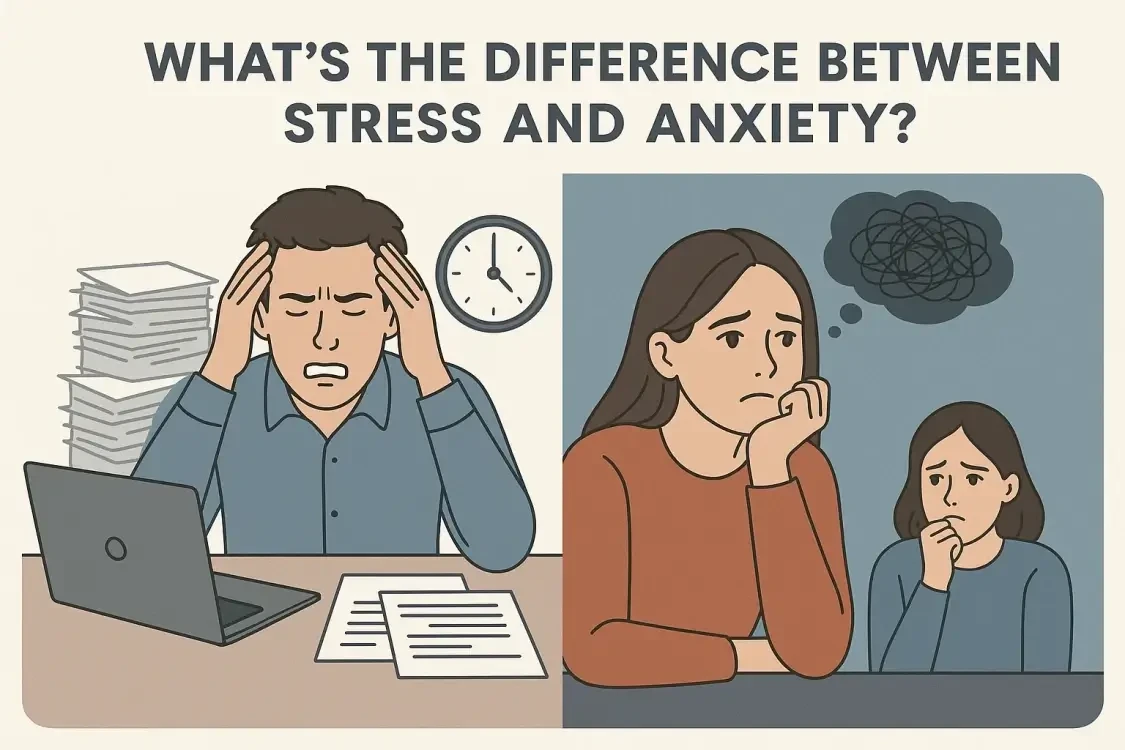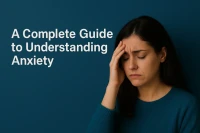Have you ever felt worried about a big test? Or your stomach felt funny before giving a speech. These feelings are normal! But sometimes kids wonder if they're just stressed or if they have anxiety. Let's learn the difference in a way that's easy to understand.
What is Stress?
Think of stress as a fire alarm in your body. When something challenging happens, your body activates this alarm to help you cope. Stress prepares you for challenges, like a hard test or moving to a new house.
When you feel stressed, your heart may race, you might sweat, and your stomach could feel upset. You might have trouble sleeping, and your muscles may feel tense. But here's something cool stress is trying to help! It gives you extra energy and focus when you need it most. It's like your body's superhero power that kicks in during tough times.
The good news is that stress usually fades once the stressful situation ends. After you finish that test or give that speech, you start to feel better quickly. It's like being nervous before a roller coaster. But once it's done, the anxiety fades away.
What is Anxiety?
Anxiety is not the same as stress. Stress comes from a specific cause. Anxiety is more like a fire alarm stuck on "on." It goes off even when there's no real danger around.
Kids with anxiety often worry about:
- Past events
- Future possibilities
- How others see them
- Making mistakes
- Being away from their parents
This worry often lingers and can sometimes feel unreasonable.
When you have anxiety, you may feel sick to your stomach. You might get headaches or feel tired. Breathing can become hard, and you might feel dizzy or shaky. Anxiety can make you anxious about everyday situations. For example, you might feel worried about going to school, even though it's usually a safe and fun place.
Stress vs Anxiety: The Main Differences
The main difference between stress and anxiety is their duration. Stress fades when the issue is resolved, while anxiety lingers even when things seem fine. Stress often comes from specific events, like tests or performances. Anxiety, however, can show up for no clear reason.
Stress usually matches the size of the problem. If you have a big test, it's normal to feel stressed. Anxiety, however, can feel overwhelming even over small issues. Stress lets you do your daily tasks, but anxiety can steal the joy from things you usually love.
Think of stress as rain that comes and goes. Anxiety, however, is like a raincloud that sticks with you all the time.
How to Tell if You Have Stress or Anxiety
Sometimes it can be hard to know which one you're feeling. Think about whether your worry fades after finishing the challenging task. Have you felt this way for weeks or months? Notice if you worry about things even when you're trying to have fun.
Pay attention to your body too. Does your stomach hurt a lot, even on good days? Do you feel tired even when you get enough sleep? Is it hard for you to pay attention in class? These could be signs of anxiety rather than just stress.
Think about your thoughts as well. Do the same worried thoughts come back again and again? Do you worry about things that won't happen? Is it hard to stop thinking about problems? If you answered yes to most of these questions, you might be dealing with anxiety instead of just stress.
Easy Ways to Feel Better
The good news is that you can do many simple things to reduce stress and anxiety. One effective method is breathing exercises. Try the "balloon breath." Breathe in slowly, as if you're filling a balloon in your belly. Then, let the air out gently, like the balloon is deflating. Do this five times and see how you feel. Moving your body can help too.
When you're worried, try these things:
- Do jumping jacks for a minute.
- Stretch like a cat.
- Play catch.
- Ride your bike.
- Swim.
Physical activity releases the extra energy that comes with stress and anxiety.
Engaging in fun activities also makes a big difference. You can lift your mood by drawing or coloring your feelings. Playing with pets helps, too. Listening to calm music or dancing to your favorite songs can also brighten your day. Doing something you enjoy can break the cycle of worry.
Talking to people you trust is very helpful. Sharing your feelings can make a big difference. You can talk to your parents, a favorite teacher, your school counselor, a close friend, or a family member. They care about you and want to help.
Creating a calm space in your room can be beneficial. Set up a special spot for when you need to relax. Add soft pillows, your favorite stuffed toy, cheerful books, or pictures of loved ones.
When to Ask for Help
It's always okay to ask for help. Some signs mean you should talk to a grown-up. If you can't sleep at night, worry too much, or feel like skipping school, seek support.
If your stomach hurts so much you can't eat, or if you feel scared most of the time, these are signs you need help. If friends notice you seem different, it's important to reach out. Remember, asking for help is brave, not weak. Even strong people need support sometimes.
Parents or guardians are a good first step. School counselors are also trained to help kids with worries. Trusted teachers can offer support, too. If needed, doctors can check for physical reasons behind how you feel. Therapists, who know a lot about anxiety and stress, can be helpful as well.
When you seek help, adults will listen to your feelings without judging you. They may teach you ways to handle worry or change things at school or home to help. You'll learn you're not alone; many kids feel this way. Most importantly, you'll find that these feelings can improve with the right help.



Comments